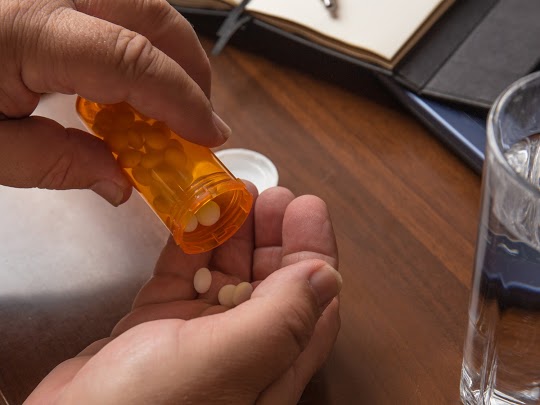
Alzheimer’s is a progressive brain disease that currently has no cure. Recent research, however, has shown how a stroke drug could be an effective and safe defense against Alzheimer’s disease and other types of dementia. This promising medicine is called 3K3A-APC.
Dementia is an umbrella term used to describe conditions that affect memory, other cognitive skills, and the ability to function in daily life. Alzheimer’s disease is the most common cause of dementia. In fact, 60 to 80 percent of dementia cases are triggered by Alzheimer’s disease.
Most people who develop Alzheimer’s are aged 65 and older. Although age is the greatest risk factor for developing Alzheimer’s disease, the condition is not a normal aspect of growing older. Younger-onset Alzheimer’s can also develop in people who are under 65.
Mild memory loss is one of the most prevalent symptoms to occur at the earliest stages of Alzheimer’s disease. As the disease gradually progresses to late-stage Alzheimer’s, the individual loses the ability to communicate and respond to the immediate environment.
How is Alzheimer’s believed to develop?
The brain is a complex organ with 100 billion nerve cells, also called neurons. Each group of neurons has a specific purpose, with some coordinating thinking, learning, and remembering; others are involved in facilitating the senses, such as sight, hearing, and smell.
Brain cells operate continuously, receiving nutrients, generating energy, and eliminating waste. The onset of Alzheimer’s disease interrupts the brain’s functioning. A large number of plaques and tangles develop in the brain of Alzheimer’s patients and damage and kill the nerve cells.
The death and destruction of nerve cells cause the memory failure, communication problems, personality changes, and trouble carrying out the activities of daily living associated with Alzheimer’s disease and other forms of dementia. These changes in the brain are irreversible.
How does the new stroke drug impact Alzheimer’s treatment?
Significant progress is being made in the research of treatments for Alzheimer’s disease and dementia. The Food and Drug Administration recently fast-tracked a human stroke drug, which is now entering Phase 3 clinical trials. The stroke drug could protect seniors from developing Alzheimer’s and dementia.
The study, first published in November 2021 in the Journal of Experimental Medicine, showed how the drug 3K3A-APC (which is a variant of human activated protein) effectively protected the white matter in the brains of mice. White matter, in humans, is the second-leading cause of dementia.
The drug 3K3A-APC is a genetically modified version of activated protein C—a human blood protein that is otherwise known as APC. Due to the protein effects of APC, inflammation is significantly reduced. Neurons and the brain vascular system are also protected against death and degeneration.
Injuries to the brain occur when small clots block the flow of blood to the brain’s white matter. As these mini-strokes continue to occur, over time, the stroke events will lead to cognitive decline. Multiple white matter strokes can cause dementia, such as vascular dementia.
The human stroke drug 3K3A-APC shows promise, however, in treating people diagnosed with white matter injuries. The drug could potentially be used to slow down the progression of cognitive decline. Further brain health benefits have been seen in the mouse models.
In previous studies conducted on mice, the drug 3K3A-APC was shown to boost brain health by improving blood flow, reducing brain inflammation, and decreasing the buildups of amyloid, which is a protein commonly found in the brains of seniors with Alzheimer’s disease.
The mouse models studies led to human clinical trials. In a 2019 Phase 2 clinical trial, the drug was deemed safe for people who had strokes caused by blood clots. These individuals received standard care. Brain bleeding was reduced in these participants, just as had been shown in mouse models.
In 2022, the Phase 3 trial for 3K3A-APC in ischemic stroke is expected to begin. Based on the recent and current data, this stroke drug shows promise for use with neurological conditions linked to cognitive impairment, such as Alzheimer’s disease and vascular dementias caused by injury to white matter.
Treatments for Alzheimer’s disease and other forms of dementia are continuously being researched. While the human stroke drug 3K3A-APC is just one potential defense against Alzheimer’s disease, an alternate therapy, called aducanumab (Aduhelm), has been shown to likely reduce cognitive decline.
Worldwide efforts to prevent, stop or slow the progression of cognitive decline associated with Alzheimer’s disease and other types of dementias are well underway. Drugs, like Aduhelm and the human stroke drug 3K3A-APC, are just two promising treatments for this devastating brain condition.
Families with elderly loved ones who live with Alzheimer’s disease or dementia have treatment options that can help change the disease progression. Both drug and non-drug options are available. Caregivers should be aware of treatments that can ease symptoms and improve overall quality of life.

While research into Alzheimer’s treatment options is currently underway, families can confidently turn to Assisting Hands Home Care for compassionate Alzheimer’s and dementia home care. We provide reliable dementia care to seniors living with any stage of Alzheimer’s disease or other type of dementia.
Professional dementia caregivers from our home care agency support dementia patients in the comfort of home. Living in a familiar and secure home environment is far more soothing to a dementia patient than residing in a nursing or memory care facility.
We wholly support the senior. Our responsibilities include help with personal hygiene tasks, providing transportation to doctors’ offices or social events, pleasant companionship to reduce loneliness, and meal preparation. Additional non-medical home care services include timely medication reminders, light housekeeping and more.
Memory care from Assisting Hands Home Care includes leading the senior to safety when he wanders, support with incontinence, and gently de-escalating the dementia patient if he becomes agitated. Families can rest assured that elderly loved ones living with dementia are supervised and cared for.
Plan for dementia care with Assisting Hands Home Care when the senior in your life is diagnosed with Alzheimer’s disease. We fulfill all nonmedical care needs for seniors living in Burr Ridge, Lyons, Indian Head Park, McCook, Hodgkins, Countryside, Willow Springs, Palisades, La Grange Highlands, Clarendon Hills, Brookfield, Western Springs, Hinsdale, Darien, La Grange, Downers Grove, Oak Brook, Willowbrook, IL and the surrounding communities. Call us at (630) 407-1932 to schedule an in-home consultation and start compassionate and dependable home care.















